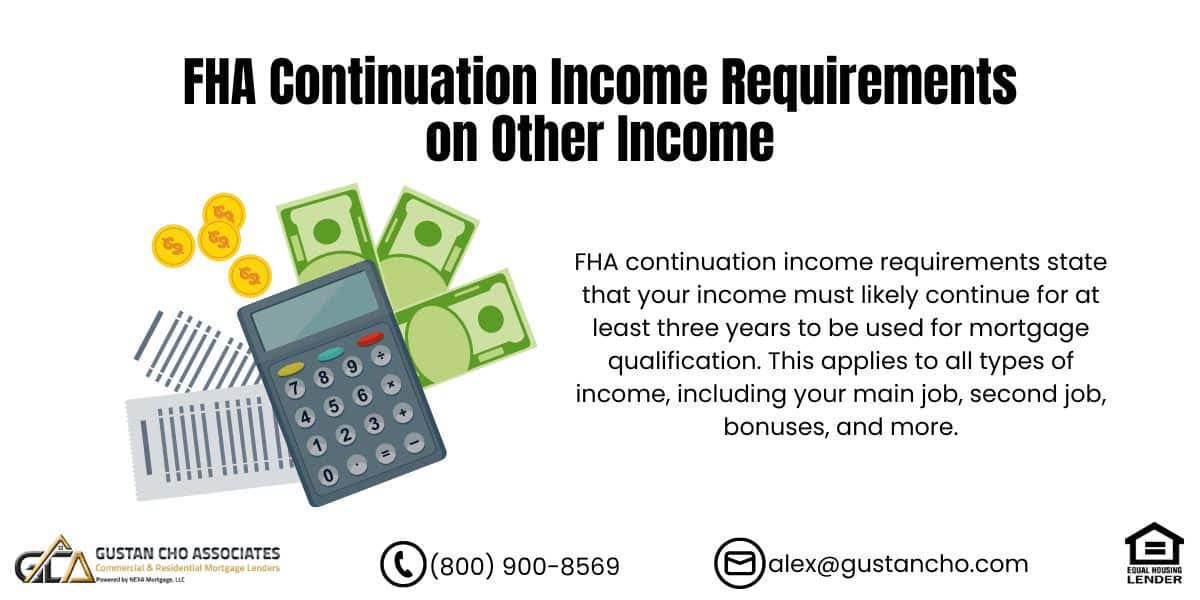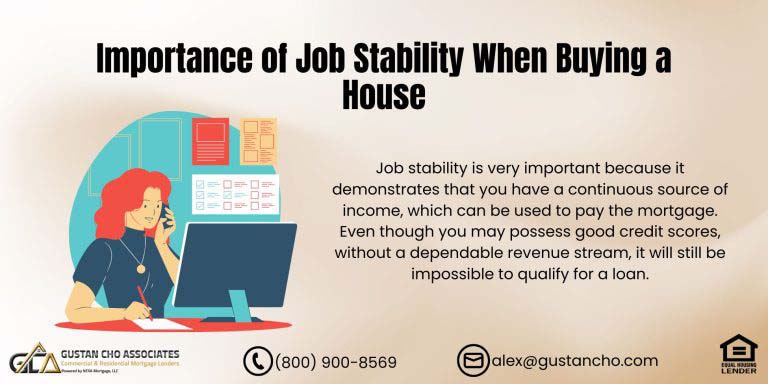This guide covers FHA continuation income requirements on second job and other income. FHA continuation income requirements state borrower’s income will likely to continue for at least three years. FHA have specific employment and income requirements and guidelines. Borrowers can have employment gaps and qualify for FHA loans. Can have part time jobs and use the part time income and qualify for FHA loans.
Borrowers can have second job, part-time, bonus and overtime income and qualify. Can have child support income, alimony income, and royalty income and qualify.
There are restrictions with all of these other types of incomes. FHA continuation income requirements will apply. All income, where is used in addition to full time income such as bonus income, overtime income, part time income, child support income, alimony income, royalty income, social security income, and pension income all need to have the likelihood to continue for the next three years. In this article, we will discuss and cover FHA continuation income requirements on second jobs, part-time income, bonus income, and other income.
Types of Income Considered as Qualified Income For Mortgage Approval
Lenders consider income when applying for a mortgage to determine the borrower’s repayment ability. Lenders typically consider various types of income to assess your ability to repay the loan. Here are some common types of income that are generally accepted for mortgage approval.
FHA Continuation of Income Requirements on Employment Income
Wages or salaries earned from full-time, part-time, or self-employment are often the primary sources of income considered by lenders. This includes regular paychecks, bonuses, and commissions. HUD, the parent of FHA, wants to see borrowers have consistent and continued employment so they have the ability to repay their housing payment and other bills. FHA continuation of income requirements on employment income is the income needs to likely continue for the next three years.
FHA Continuation of Income Requirements on Self-Employment Income
Self-employment income can be used for FHA loans as long as the borrower had two years longevity as a self-employed wage earner the the continuation of income is likely to continue for the next three years. Income earned from owning and operating a business or freelance work. Lenders may require additional documentation to verify self-employment income, such as tax returns and profit and loss statements.
Need Help with FHA Loan Income Requirements? We Can Guide You Through It!
Reach out now for a consultation on how to meet these requirements and get pre-approved for your FHA loan.FHA Continuation of Income Requirements on Rental Income
Income generated from renting out properties you own. Lenders typically consider a portion of rental income when calculating your debt-to-income ratio. Rental income can be used if the rental income is on schedule C of the federal income tax returns and the rental income is likely to continue for the next three years.
FHA Continuation of Income Requirements on Investment Income
Income from dividends, interest, and capital gains. This may include income from stocks, bonds, mutual funds, or retirement accounts. Investment income that is consistent and likely to continue for the next three years can be used as qualified income.
FHA Continuation of Income Requirements on Alimony and Child Support
Court-ordered payments from a former spouse or partner to support children or ex-spouse. Lenders may require documentation to verify the stability and consistency of these payments. The likelihood to continue for the next three years needs to be established on order for alimony and child support payment to be used.
FHA Continuation of Income Requirements on Retirement Income
FHA continuation of income requirements on retirement income can be used. Income from pensions, Social Security benefits, annuities, or retirement savings accounts such as 401(k)s or IRAs. Lenders may consider retirement income if it is expected to continue for at least three years.
FHA Continuation of Income Requirements on Other Sources of Income
Other types of income, such as royalties, trust income, or income from border or foster care, may also be considered by lenders, depending on their stability and consistency. It’s important to note that lenders may have specific requirements and guidelines for each type of income, and documentation may be required to verify the source, amount, and stability of income. Additionally, some types of income may limit how much can be considered for mortgage approval. Working closely with a mortgage lender or broker can help you understand the specific requirements and options based on your financial situation.
FHA Continuation Income Requirements on Employment
FHA allows borrowers with full time employment as well as part time employment to qualify for FHA loans. With full time employment, gaps in employment is allowed within the past two years and multiple full time job changes are allowed in qualifying for FHA Loans. Longevity in current employment shows stability to mortgage underwriters. But changes of employment does not disqualify borrowers from qualifying for FHA loans.
If you had an employment gap of less than six months, then there are no longevity seasoning requirements if you get a new full time job to qualify for a FHA loan.
Mortgage borrowers will need 30 days of paycheck stubs from your new full time employer in order to close on your home loan as well as a written verification of employment from the current full time employer. The full time employment needs to be secure and at least of 3 years of future employment needs to be likely. If you had six or more months in employment gaps, you need to have worked at least six months on your new job in order to qualify. Borrowers will need a written verification of employment from new employer. The new employer needs to state that employment is likely to continue for the next three years.
FHA Continuation of Income Requirements Using Other Income
In order to be able to use part-time income, bonus income, overtime income, borrower needs at least a two year seasoning requirement and history of receiving stable income. In order to be able to use part time income, bonus income, and overtime income to qualify for a mortgage loan, those income needs to likely continue for the next three years. Borrowers can use child support income, alimony income, and royalty income to qualify for a FHA loan if and only if these types of income is likely to continue for the next three years.Income received from disability insurance, workers’ compensation, or other disability benefits. Lenders may require documentation to verify the permanence and stability of disability income.
FHA Continuation of Income Requirements on Child Support and Alimony Income
Child support income and alimony is closely scrutinized to make sure that the income is likely to continue for the next three years. Child support or alimony paperwork will be required by lenders to make sure the end date of the child support or alimony payments. Same with royalty income. Royalty income which is not permanent, proper paperwork will be required to make sure that the royalty income will continue for the next three years.
Have Other Sources of Income? Let’s Make Sure They Meet FHA Continuation Income Requirements!
Contact us today to learn how your other income can work for you when applying for an FHA loan.FHA Continuation of Income Requirements on Social Security and Pension Income
Social security income and pension income are normally continued for the life of the mortgage loan borrower but the social security awards letter and the pension plan awards letter needs to be provided to the mortgage loan underwriter. Nobody has a crystal ball what the future holds with one’s employment stability. However, lenders want as much reassurance as possible that the borrower’s income will continue for the next three years after they close on their home loans. The number one reason why mortgage loans default and the reason for foreclosure is due to borrower’s losing their jobs.
FHA Continuation of Income Requirements on Disability Income
FHA continuation of income requirements on disability income can be tricky. In order to be able to use disability income, the likelihood of continuing for the next three years need to be determined. That is often difficult to do. However, if the borrower has received disability income the past three years and has a permanent illness or injury. The likelihood it will continue for the next three years is most likely if the borrower has a history of receiving disability income the past two years.
Disability income refers to payments or benefits provided to individuals who are unable to work due to a disability. This income is intended to help replace lost wages or provide financial support to cover living expenses.
Disability income can come from various sources, including government programs such as Social Security Disability Insurance (SSDI) or Supplemental Security Income (SSI), employer-sponsored disability insurance plans, or private disability insurance policies purchased by individuals. The amount and duration of disability income can vary depending on factors such as the severity of the disability, the individual’s work history, and the terms of the specific disability insurance policy or program. HUD requires disability income is likely to continue for the next three years.
FAQs: FHA Continuation Income Requirements on Other Income
-
1. What are FHA continuation income requirements? FHA continuation income requirements state that your income must likely continue for at least three years to be used for mortgage qualification. This applies to all types of income, including your main job, second job, bonuses, and more.
-
2. Can I use income from a second job to qualify for an FHA loan? Yes, you can use income from a second job to qualify for an FHA loan. But it must meet the FHA continuation income requirements. Meaning it should likely continue for the next three years.
-
3. Are part-time job incomes eligible under FHA continuation income requirements? Yes, part-time job incomes are eligible. But they must meet the FHA continuation income requirements. This means the income should be stable and likely to continue for the next three years.
-
4. Can bonus and overtime income be considered for FHA loans? Yes. Bonus and overtime income can be considered if they meet the FHA continuation income requirements. Meaning they should be consistent and likely to continue for the next three years.
-
5. Is child support income acceptable for FHA loan qualification? Yes, child support income is acceptable for FHA loan qualification. It must meet FHA continuation income requirements, meaning it must be expected to continue for the next three years.
-
6. What documentation is needed to prove income continuation for FHA loans? You will need various documents such as pay stubs, employment verification letters, tax returns, and legal documents (for child support or alimony) to prove that your income meets FHA continuation income requirements.
-
7. Can self-employment income be used to qualify for an FHA loan? Yes, self-employment income can be used to qualify for an FHA loan. If you have been self-employed for at least two years and the income is likely to continue for the next three years, you’re eligible.
-
8. How do FHA continuation income requirements apply to rental income? Rental income can be used for FHA loans. It must be reported on your tax returns and is likely to continue for the next three years.
-
9. Are social security and pension incomes considered under FHA continuation income requirements? Yes, social security and pension incomes are considered if they are expected to continue for at least three years, complying with FHA continuation income requirements.
-
10. Can alimony income be used to qualify for an FHA loan? Yes, alimony income can be used to qualify for an FHA loan if it is likely to continue for the next three years, in line with FHA continuation income requirements.
If you have any questions about FHA Continuation Income Requirements, please contact us at 800-900-8569. Text us for a faster response. Or email us at alex@gustancho.com. The team at Gustan Cho Associates is available 7 days a week, on evenings, weekends, and holidays.
This blog about FHA Continuation Income Requirements on Other Income was updated on July 29th, 2024.










